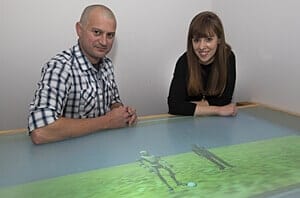A discovery into the workings of the human nervous system is expected to have a “transformative impact” on how scientists understand the role of perceptual-motor delays in human and animal behavior, as well as understandings of the dynamics of behavioral anticipation. The NIH-funded research project conducted by Auriel Washburn, a University of Cincinnati doctoral student in psychology, is published online this month in The Journal of Experimental Psychology: Human Perception and Performance, a journal of the American Psychological Association.
The researchers say the study demonstrates that inherent delays in the nervous system may play a constructive role in enabling individuals to anticipate the movement of others.
Human behavior, explain the researchers, can be highly unpredictable in how humans react or move. It’s not always a clear, stable pattern. The study aimed to explore how one person is able to coordinate with the movements of another person when the movements are unpredictable and chaotic. For example, such chaotic movement can occur between athletes coordinating with each other on a team, or between people working in tandem on chores like loading a dishwasher, or navigating a room packed with people.
“In addition to the fact that we know we have these intrinsic delays in our nervous system, our experiment sort of built on and exaggerated those delays, and demonstrated how they can increase one’s ability to anticipate the chaotic movements of another co-actor,” says Washburn.
The study focused on an arm movement task involving a total of 22 people divided into 11 pairs. A leader and follower controlled dots on a screen, using hand-held motion tracking sensors. The leader was taught to produce chaotic and unpredictable movements, and the follower was asked to reproduce and synchronize with the leader’s movements. After introducing a small feedback delay between when the follower would physically move and when their dot moved on the screen, the researchers found that, contrary to traditional thinking that a feedback delay would be a hindrance to coordination, the delay actually allowed the follower to better anticipate the unpredictable and chaotic movements of the leader.
“The results of this study are profound, because it could potentially change the way we understand how the nervous system works and how perpetual-motor delays play a role in human behavior,” says Washburn’s co-researcher and advisor, Michael J. Richardson, an associate professor of psychology.
The researchers say the discovery could also impact future research into areas such as the development of robotics, with the addition of small feedback delays enabling those systems to better anticipate unpredictable human behavior. “These findings could aid in the development of any artificial system that works with a human,” says Richardson.


